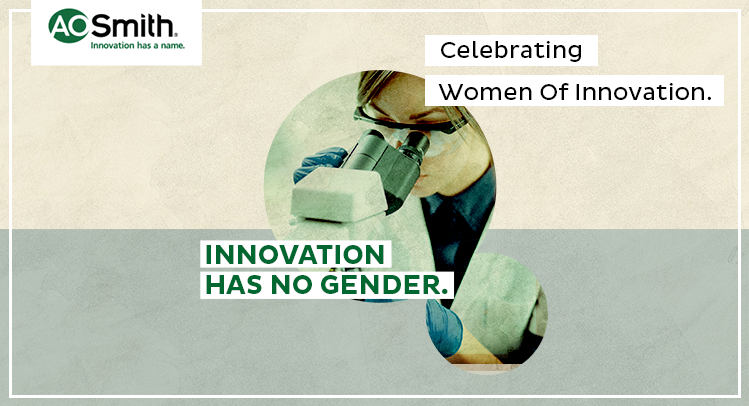
For the last 144 years, A. O. Smith has strongly believed that innovation is the cornerstone of achieving the heights of success. As an organization that thrives on continuous development in the field of technology, we have always endeavored to emphasize this point through our tagline, ‘Innovation has a name’. Unfortunately, society has had a slightly different approach to this philosophy. For centuries, historians and academicians have insisted that innovation has not only a name, but also a gender.
This is easily proven by the existence of a phenomenon known as the ‘Matilda Effect’. In simple terms, this effect can be described as an implicit bias against recognizing the achievements of women scientists and attributing their work to male colleagues. It was originally identified in 1870 by Matilda Joslyn Gage in her essay, “Woman as Inventor”, and the term was named after her in 1993 by science historian Margaret W. Rossiter.
The first known case of this effect dates back to the 12th century, when medical texts written by Italian physician Trota of Salerno were accredited to male authors after her death. Since then, several extraordinary female scientists including Lisa Meitner, Rosalind Franklin, Nettie Stevens, Marietta Blau, and Marie Curie have been studied as examples of the Matilda Effect.
Clearly, there is no shortage of women whose inventions were blatantly assumed to belong to men. Therefore, for Women’s History Month this year, we at A. O. Smith, your favorite Water Heater manufacturer, wanted to initiate a discussion and celebrate the women in innovation. Women who worked tirelessly to broaden the scope of scientific possibilities and make their presence felt in the field of science.
To get the conversation started, we decided to conduct a small quiz that featured six questions referring to noteworthy innovations, and 18 names of men and women to choose from. As a reward, we offered an A. O. Smith RO Water Purifier to the participants. What we did not disclose, however, was the fact that this was not just any quiz – it was a social experiment. The aim was to determine whether the bias that formed the basis of the Matilda Effect still existed in people’s minds.
A total of 3,370 people responded. Out of that, a staggering 71% picked men as the innovators, whereas in reality, every single one of the innovations were by women. In case you’re wondering just how obscure these inventions were that more than half the participants did not know of them, they included game-changing discoveries like radium, computer programming, rocket propulsion systems, and Kevlar – the bulletproof fiber.
So, what conclusion did we derive from this experiment? Quite simply, we found that names such as Marie Curie, Ada Lovelace, Yvonne Brill, and Stephanie Kwolek, which should be heralded as a beacon by men and women around the world, or at the very least, credited for their contributions, are in fact deeply buried underneath the notion that female genius does not extend to mechanics.
From disposable diapers to the GPS on your smartphone, women have developed amazing things. The least we can do is remember their names, keep their legacy alive, and respect the ones who are striving to share their creations with the world today, just as we remember the men. Because, at the end of the day, every innovation should have a name, but it must not have a gender.
